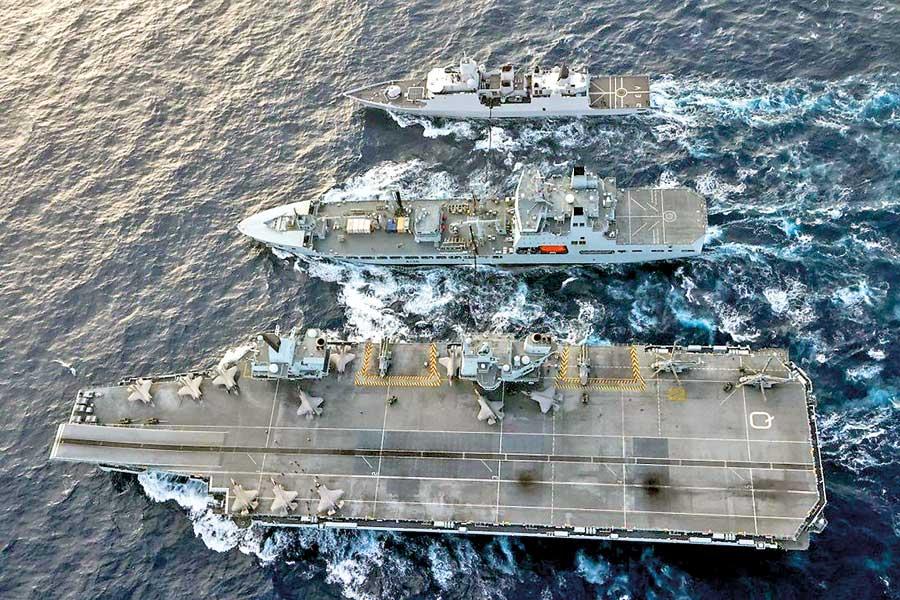13 Aug 2021 - {{hitsCtrl.values.hits}}

A US Navy Twitter photo shows American, British and Dutch warships conducting operations in the South China Sea on July 29.
While the people all over the world are fighting what appears to be a losing battle against an invisible virus which keeps transforming itself into more virulent forms to stay ahead of any anti-virus medication or vaccines, big powers show no intention of setting aside their power games and pay their total attention on the war against the virus.
keeps transforming itself into more virulent forms to stay ahead of any anti-virus medication or vaccines, big powers show no intention of setting aside their power games and pay their total attention on the war against the virus.
Common sense dictates that a pandemic is no time to settle old or new scores between nations. Instead, a pandemic offers an opportunity to shelve hostilities and forge unity, at least temporarily, to fight the virus through a well-coordinated global vaccination programme. But it is not to be. The reality is far from the ideal situation where nations, rich and poor, will pool their resources for each nation to take from the pool what it needs to cope with the health emergency, while rich nations in their largesse will write off the poor nation’s debts. The need of the hour is not to be a Shakespearian usurer but to practise altruism and charity to the fullest.
Although the altruism rich nations displayed in recent weeks and months by sharing their excess anti-covid vaccines is commendable, it falls short of what the ideal situation should be.
The reality is even in the vaccine philanthropy, there is an element of politics. May be, it is a way of demonstrating the soft power. May be, there is an attempt to win new allies or woo back lost allies, because in international politics, a nation’s power is not only gauged by its wealth, military might and the size of the population, but also by its alliance-making capabilities. The more allies a big power has, the more power it wields in international politics.
This power equation assumes greater significance in the context of the power imbalance arising from China’s gallop to be the front runner, replacing the United States in the global power race.
It is said that in just nine years, China will emerge as the world’s number one economy. But that alone will not make China the number one nation. The gap to be bridged is still vast because the US is still far ahead in per capita income and alliance formations. There are no China-led military alliances to match the US-led military alliances such as the North Atlantic Treaty Organization (NATO), ANZUS, and now the Quad that brings Japan, Australia and India under the US defence umbrella. The US also counts South Korea, several ASEAN (Association of South East Asian Nations) countries and Taiwan as its allies, in addition to Arab Gulf states.
Since the end of the Cold War in 1991, the NATO has been expanding and is now only a short-range missile throw away from Russia. In quiet manouevres, the US has also been carrying out a military buildup to encircle China.
It was against this backdrop that China has been asserting itself and resorting to aggressive diplomacy in well-calculated moves that will help China to achieve its geopolitical goals without provoking a major conflict with the US.
"Nowhere are China’s aggressive diplomacy and the United States’ military dependence on its allies more evident than in the South China region where China has drawn a nine-dash line to demarcate what it insists as its sea boundaries"
Nowhere are China’s aggressive diplomacy and the United States’ military dependence on its allies more evident than in the South China region where China has drawn a nine-dash line to demarcate what it insists as its sea boundaries. The US, its allies and other nations in the region have strongly contested Beijing’s claim, often leading to heightened tensions. Vietnam, the Philippines, Malaysia, Indonesia, Brunei, and Taiwan are claiming parts of the sea and ownership to various islands.
The Philippines moved the world court and won a judgement in its favour, after successfully arguing its case in terms of the Law of the Sea principles. Although China ignores the Hague ruling, it invokes the Law of the Sea principles to assert its claim for the waters around artificial islands it keeps building in the South China Sea.
In the opinion of the US and its allies, asserting their freedom of navigation is necessary to maintain their position that much of what China claims as its territorial waters is international waters.
Given the untapped resources of the region, there is little surprise that the South China Sea is increasingly becoming a hotbed for military buildups. Apart from accounting for 12 percent of the global fish catch, the sea is replete with seven billion barrels of untapped oil and 900 trillion cubic feet of natural gas. Besides, it is one of the busiest waterways for trade and merchant shipping, accounting for 20 to 30 percent of global trade.
Once again, the South China sea has become a theatre of high military drama, with China conducting a five-day long military exercise from August 6 to flex its muscles in the aftermath of and ahead of the visits of several foreign warships to the region. In what is seen as a first in 20 years, Germany on August 2 deployed a warship to the region.
Also deployed in the shaken seas will be four Indian warships. They will be in the region for two months, joining warships from the US, the UK, Australia, France and Germany for joint drills aimed at ensuring freedom of navigation in the region to counter what they see as China’s expansionist claims. As tensions rose to dangerous levels, China believes these warships are in the region at the behest of the US. China also said its military chased a US warship from its territorial waters in the South China Sea. The US Navy denied any such incident.
The growing tension saw China and the US on Monday sparring at the United Nations Security Council meeting on maritime security.
Referring to China’s increasingly assertive claims to a large chunk of the South China Sea, despite the International Court of Justice ruling, US Secretary of State Antony Blinken warned that the conflict there or in any ocean “would have serious global consequences for security and for commerce.”
“In the South China Sea, we’ve seen dangerous encounters between vessels at sea and provocative actions to advance unlawful maritime claims. The US has been clear its concerns regarding actions to intimidate and bully other states lawfully accessing their maritime resources.”
In response, China’s deputy ambassador Dai Bing accused the US of becoming “the biggest threat to peace and stability in the South China Sea.”
He said China would sort out the disputes with ASEAN members peacefully and insisted the US was an outsider in the region and was not even a party to the Law of the Sea Convention.
To defuse tensions such as this, what is required is a rule-based international order. It is easier said than done, especially when the very big powers which campaign for such an order flout the rules with impunity.
28 Nov 2024 6 hours ago
28 Nov 2024 7 hours ago
28 Nov 2024 8 hours ago
28 Nov 2024 9 hours ago
28 Nov 2024 28 Nov 2024